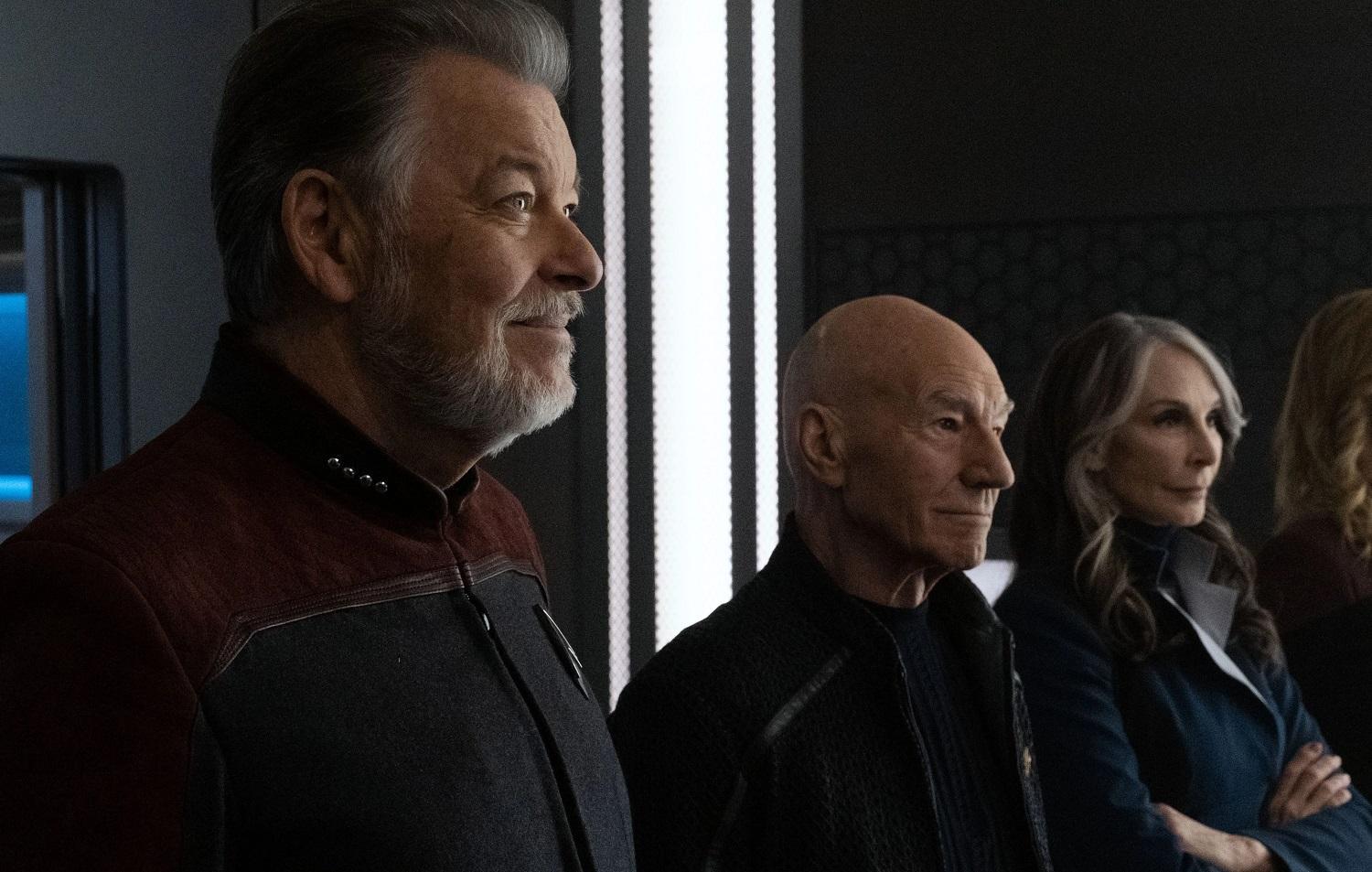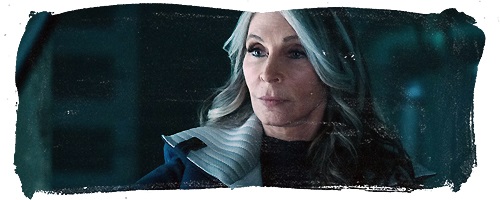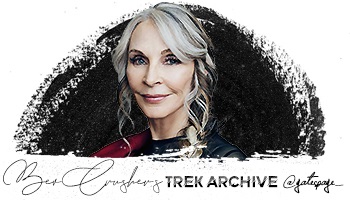
Joe Utichi
June 16, 2023

The third and final season of Star Trek: Picard went out with a bang this year, reuniting the cast of Star Trek: The Next Generation and delivering a compelling conclusion to a story that started 37 years ago. Patrick Stewart, Gates McFadden and Jonathan Frakes reflect on their earliest days, and describe the emotion they felt as they stepped back onto the bridge of the USS Enterprise.
DEADLINE: Do you remember your first meeting with one another, way back in 1986?
JONATHAN FRAKES: I do remember the first time I met Patrick. We’d been called into the makeup trailer to meet the great king of makeup, Michael Westmore. Patrick and I introduced ourselves to one another, and we got right into a cricket versus baseball conversation that eventually led to him becoming a big LA Dodgers fan [laughs].
GATES McFADDEN: I was doing a play with Linda Hunt called The Matchmaker, down in La Jolla. Patrick came down to see it. We went out to dinner and it was all very exciting; we found we had a lot of mutual friends who were in the Royal Shakespeare Company. We talked all night. We both said, “I don’t know, I’m nervous about this whole thing…”
PATRICK STEWART: I remember people telling me not to worry about signing a six-year contract. They said, “You’ll be lucky to make it through the first season.” You cannot revive an iconic series, that’s what they told us. I was told, “Get a plane ticket, come over here, do the show, make some money for the first time in your life, and work on your tan, then you can go home.”
FRAKES: You have to remember, audiences were not ready for a bald English captain with a French name. And a Klingon on the bridge, and a blind guy driving. It was a very strange environment and people were skeptical to say the least. I didn’t know anything about Star Trek. Neither did Gates, or Brent [Spiner], or Patrick. I think [Michael] Dorn did, and I know your space son, Gates, Wil Wheaton did. But we had different tastes in television — in spite of the fact that my wife, the wonderful Genie Frakes, had a poster of Captain Kirk on her bedroom wall when she was a kid [laughs].
McFADDEN: Brent said the same, that we just didn’t know if this was a good idea.
Johnny, do you remember the first time I met you? We went to a costume fitting the day before a shoot, and I was so excited and intense about it all. It was a silly scene in a shopping mall. I said, “Can we rehearse? Can we go over the scene?” You looked at me and just said, “Sure.” After about three times, you were like, “I think we’ve got it.” It was a four-line scene [laughs]. But I’d never done anything like this; committed to a series like that.
STEWART: Of course, I found out eventually that I was also signing up for six years of Jonathan Frakes.
FRAKES: Hey, now [laughs].
DEADLINE: Star Trek: Picard’s third season reunites the whole Next Generation ensemble. The chemistry between the characters takes us right back to Next Gen when it had hit its stride. How long did it take you to settle in and find that chemistry?
FRAKES: I don’t think we got rolling until about the third season of Next Generation, in terms of chemistry. The writers didn’t know yet who they were writing for. For us, I’d never worn a silly spandex spacesuit with no pockets. I didn’t know how to act without my f*cking hands in my pockets. It was a lot to learn. And the technobabble. God bless Brent and LeVar [Burton], who were given the bulk of it.
McFADDEN: Excuse me, Beverly had quite a lot to say, too.
FRAKES: Yeah, and Beverly Crusher, my apologies [laughs]. I had the great privilege that for most of the scenes, we’d be gathered as a crew and I just had to sit next to the captain and say, “Report.” Then I could listen to everyone else mumble the technobabble, and Patrick would wrap it up. That was my favorite kind of scene.
STEWART: My knowledge of Star Trek was so minimal, and my knowledge of being on a soundstage with cameras and 40 crew was non-existent. I wasn’t called to shoot on the first day, and I remember being very annoyed about that. I wanted to be there from the start. I wanted to experience everything. So, I went out to the location in Griffith Park, just to watch how they did it. It was Brent and you, Jon.
FRAKES: The “Pop Goes the Weasel” scene.
STEWART: The ease and relaxation with which everyone was approaching that day’s work so impressed me. I think maybe I’d been unlucky. Whenever I’d been on camera, or where cameras were the observers, I had experienced tension and stress and anxiety. The atmosphere that day in Griffith Park was so relaxed. You and Brent were working together as though you’d been doing it a lifetime, and you’ve never worked together before, had you?
FRAKES: No. We’d done a play reading, but never anything on camera before, and certainly not with these characters.
STEWART: Those first days for me was just acquiring information and experience at the highest possible speed, and from the beginning there was a cooperative and social atmosphere on set. There was a lot of fun, too, a lot of humor, for which I paid a big penalty down the road [laughs]. But most of the first season, for me, was a huge learning experience.
I’ve watched quite a lot of it in the past few months as we’ve been talking about Picard, and I must say I’m not happy with a lot of the work I did in that first season. It was a little artificial, not spontaneous, not being in the moment. Not all of those things that are now fundamental to whatever we do. It got better as it went on.
FRAKES: I feel the same way. I had the exact same reaction to watching those early shows. I felt physically uncomfortable — and I look it. I was clearly nervous. I wasn’t centered, and wasn’t relaxed, despite appearances.
McFADDEN: That spacesuit, Johnny. It’s true that when you’re in this kind of leotard suit, it felt like some kind of heightened reality. I also knew nothing of hitting marks, being mindful of the camera and the crew. I was intimidated by it all, and I’d come in late, because I was still doing my play down in La Jolla.
Do you remember, we couldn’t make any noise? You couldn’t put anything down on the set, because it would make a huge noise and then you’d have to dub the entire scene.
DEADLINE: You sat out the second season, Gates. When you came back for Season 3, did you start to feel more comfortable?
McFADDEN: The character was different when I came back. They’d had a different doctor, Pulaski, who was a bit more Bones-like, and that’s who they were writing Season 3 for. Suddenly, my character was a little more matronly. So, no, I was a little lost for the next couple of years, really, and didn’t really get into some great writing for the character until much later. I did have a couple of really wonderful episodes, like “Remember Me”, that were a little earlier.
DEADLINE: You each got episodes that allowed you to sink your teeth into your characters. As you got more comfortable, did you start to feel the potential of what you could do through the show?
FRAKES: Of course. And as they got to know us better, the writing made that easier to find. Patrick seemed to have a grasp of the captain before the rest of us had a grasp of who we were. At least, it felt that way to me. Patrick had some center, some position, that we didn’t have. He didn’t seem very nervous to us during Season 1.
STEWART: Oh, boy [laughs]. The comfort and reassurance that I perhaps projected came from years and years before I went to Hollywood, playing leaders, kings, princes, soldiers, warriors, in half of the plays of Shakespeare. I leant on that, I think, and while it may have given me that sense, rewatching the episodes I’m left with the feeling that I was too formalized. Too predictable. There wasn’t much of a human being there.
FRAKES: This might be a good time to remind you about the one-man show that Patrick did called Kings, in which he played a number of kings, including Billie Jean King, B.B. King, and of course, Elvis, which was my personal favorite [laughs].
McFADDEN: Patrick, which year was it when you directed us in Every Good Boy Deserves Favour, the Tom Stoppard play? That, to me, was one of the greatest experiences of my entire time doing the show. It wasn’t Star Trek, but it was, because we were all there and we were all very tight. We had Colm Meaney as well. We did it with an 80-piece orchestra in different cities, and they sold out, 6,000 seats every time. It was Star Trek fans; many of whom had never seen a theater, let alone a play, or an orchestral performance. It was phenomenal, and it was Patrick’s idea.
STEWART: As we were doing five days of work every week on the show, Monday to Friday.
FRAKES: And then to go to Chicago on the weekend and play Stoppard. That was a great period. I loved that. I think it was 1992. We started in LA, then went to Chicago. We played with the Atlanta Symphony. And Minneapolis. It was a beautiful experience, and we were directed by our captain.
DEADLINE: It has been more than two decades since the last Next Generation movie, Star Trek: Nemesis. Returning to Picard, how quickly did the characters come back to you?
FRAKES: Our family of friends never stopped knowing one another, so there was no feeling of reunion. We hadn’t been apart. What was unfamiliar was stepping back into a turbolift, waiting to walk back onto the bridge of the Enterprise-D. That was quite an emotional experience.
STEWART: I found it wonderful, because there was a lot of talking before it was finally confirmed there would be a new Star Trek show called Picard. During those conversations, I had felt strongly — largely based on my pride for what we had achieved with The Next Generation — that I didn’t want to mess up the work by making the show a series of sentimental reunion episodes, with us having fun and going on adventures. We’d done that, and we’d done it very well. Not all the time, but most of the time [laughs].
But 20 years had passed. And I remember Akiva Goldsman saying to me, “Patrick, your life has changed in the past 20 years. So many things have happened to you. Are you the same person you were then?” I realized then that it didn’t have to make reference to The Next Generation at all. What had been happening to these characters in those 20 years? Who were they today? I already knew mine had been up and down — captain, admiral, a desk job, not flying a spaceship.
McFADDEN: The reason to come back was that Terry [Matalas] pitched a really great story, and I loved it. I liked the fact it was different, that the character was much more three-dimensional as far as I was concerned. I loved that it was a story about the corruption of the Federation, because our world today is so full of corruption; of the environment, of the values we’d grown up with. You read three newspapers in the morning and you’re ready to go back to bed.
DEADLINE: Star Trek has always been at its best when it’s shrouding real-world issues and human experience in science fiction. This season too, Patrick and Gates, you’re working out your relationship as Picard is discovering a son, he never knew he had, and what that means for his life, for his legacy. Jonathan, you are dealing with grief over the loss of your son. I’m sure you’ve heard from people who have been affected by that kind of loss in their own lives.
FRAKES: I certainly have, and it has been very moving. Terry pitched a really satisfying arc for the third season, so it wasn’t necessarily a reunion. Each of the characters had to earn their entrance, and meet their position in the storytelling, and we each brought those 20 years of life back to it. There was conflict again, which as we know is the basis of all drama. Matalas really delivered what he promised us all at lunch one day, and I was thrilled to be a part of it.
McFADDEN: Terry did such a great job because he really loved TNG, and he loved our characters. There were more Easter eggs planted on that set than even I knew about. He knew more about the series than most of us, and certainly me. Some fans have said, “It was all action, and not enough talking about philosophy.” But look at the world. We have to take action, to prevent voter fraud, to stop this corruption that’s all around us in so many ways.
STEWART: It was very significant that we had Jonathan, who had broken down the barrier during The Next Generation of, “No, no no. The actors don’t get to direct episodes as well.” He broke that barrier down, and so he was able to bring his role as director, and all the experience he’s had, to this set.
Even though Jonathan, better than anyone else I know, can switch very easily from one move to another, at times he would have to make critical comments about what he was seeing that he thought wasn’t right. Now, that’s not an easy task ever, but under circumstances like these it’s even harder. At the heart of it all is affection, and I speak for everyone on our cast and crew. There is respect, there is admiration, and an intense love for one another in order that we protect this show and these characters. I mean it when I say this was a unique experience. I’ve had many wonderful experiences in my life, but there’s been nothing quite as unique as what we had in The Next Generation and, now, in Star Trek: Picard.
McFADDEN: That’s true of Jonathan, and it’s also true of LeVar, too, when he directs. I feel we all will help each other out, because we want everyone to do the best, and we know one another and know what we’re each capable of. That’s very different from other sets, because I don’t have the history with anyone else that I have with this cast. You’re not going to be bold enough to say, “Hey, if I were you, I’d roll that line just a little faster.” We do, because we know we’re on one another’s side.
DEADLINE: What has the reaction to the show meant to you?
FRAKES: LeVar said the other day that we didn’t dare hope it could be this good, or that we could revisit this world, this friendship, this family. I think it’s even better than we could ever have dared hope. I’m proud of the work, the time and the experience. And it has only made our friendships stronger.
Audiences reacted in a way I have never experienced before, as an actor or a director. The outpouring of support has been, at times, a little overwhelming. I don’t want to be caught in the bubble of it because that’s a danger, but I’ve been so grateful.
McFADDEN: I’ll toast to that. I’m grateful and I feel the same way. It has been a complete surprise; a surprise that it happened and a surprise that it has been so well-received.
STEWART: It was a gamble, wasn’t it?
FRAKES: It certainly was.














